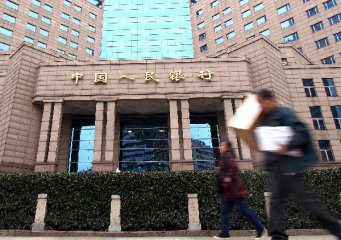
BEIJING, Nov. 19 (Xinhua) -- China's central bank Monday launched a seven-day reverse repo and cut its rate by 5 basis points to 2.5 percent, in order to cut fund-raising costs for enterprises.
This is the first such cut in the reverse repo rate in more than four years, according to the China Securities Journal.
The People's Bank of China injected 180 billion yuan (about 25.71 billion U.S. dollars) into the market through seven-day reverse repos. Before this, the central bank reverse repo operation had been suspended for 15 working days.
A reverse repo is a process in which the central bank purchases securities from commercial banks through bidding, with an agreement to sell them back in the future. In this way, commercial banks can raise short-term capital. It is the equivalent of a short-term loan with the securities serving as collateral.
The stock market and bond market rallied in response.
This round of open market operations to cut loan costs began earlier this month. On Nov. 5, the central bank cut the interest rate of one-year medium-term lending facility (MLF) to 3.25 percent, 5 basis points lower than the previous MLF.
Last Friday, the central bank launched one-year MLF again and maintained an interest rate of 3.25 percent.
The MLF tool was introduced in 2014 to help commercial and policy banks maintain liquidity by allowing them to borrow from the central bank using securities as collateral.
Wen Bin, chief researcher with China Minsheng Bank, said the reduction in the reverse repo rate reflected the central bank's efforts to strengthen counter-cyclical adjustments and in addition to the 600 billion yuan MLF operations that began in November, the central bank ensured reasonable liquidity through a combination of short-and long-term policy instruments.
The central bank said in its quarterly policy report issued Saturday that it will use a variety of monetary policy instruments to provide short-term, medium-and long-term liquidity and maintain banking stability.
The central bank will step up counter-cyclical adjustments while staying away from using a deluge of stimulus policies, the report said.




















Latest comments